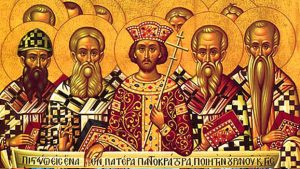 “Holy Father, keep them in your name that you have given me, so that they may be one just as we are” (John 17:11).
“Holy Father, keep them in your name that you have given me, so that they may be one just as we are” (John 17:11).
This Sunday commemorates the first ecumenical council (council of the whole Church), held in the city of Nicea, near Constantinople, in the year 325. The Gospel read on this Sunday is the final part of Jesus’ last teaching discourse to his disciples, just before he was arrested, as recorded by John. This gospel tells us about the whole divine plan for our glory and salvation.
Jesus first tells his disciples that he must leave them. Leaving them, however, does not mean abandoning them. Jesus says, “I will not leave you orphans; I will come to you. In a little while the world will no longer see me, but you will see me, because I live and you will live. (John 14:18-19)” First, Jesus is going because he is the way, the truth and the life. (John 14:6). Second, “And if I go and prepare a place for you, I will come back again and take you to myself, so that where I am you also may be” (John 14:3). Jesus tells us, “It is better for you that I go. For if I do not go, the Advocate will not come to you. But if I go, I will send him to you” (John 16:7). Why? Because “when he comes, the Spirit of truth, he will guide you to all truth” (John 16:13).
The climax of everything is that we will become like God, one in the Holy Trinity, “now I will no longer be in the world, but they are in the world, while I am coming to you. Holy Father, keep them in your name that you have given me, so that they may be one just as we are” (John 17:11).
This is the glory of God, to bring all together in unity, for God is one. This does not mean that we will all be the same, for God has created us in a wonderous diversity, but we will all be united because there is only one truth, and we must live in the one truth. This is why the Council formulated the one truth about the one God, in the Holy Trinity. Each and every one of us must glorify God in the one truth, in “one mind and one heart” (Anaphora).
We must avoid the delusion that the truth must be the way we see the world, it is only in the one truth of how God sees his creation. “When he comes, the Spirit of truth, he will guide you to all truth” (John 16:13). However, we must work to find this truth, we have to listen to one another, we have to love one another, as God has loved us, for “God is love.”
Ecumenism is more than a theological opinion, it is God’s life in us.
Meditation by Archpriest David Petras
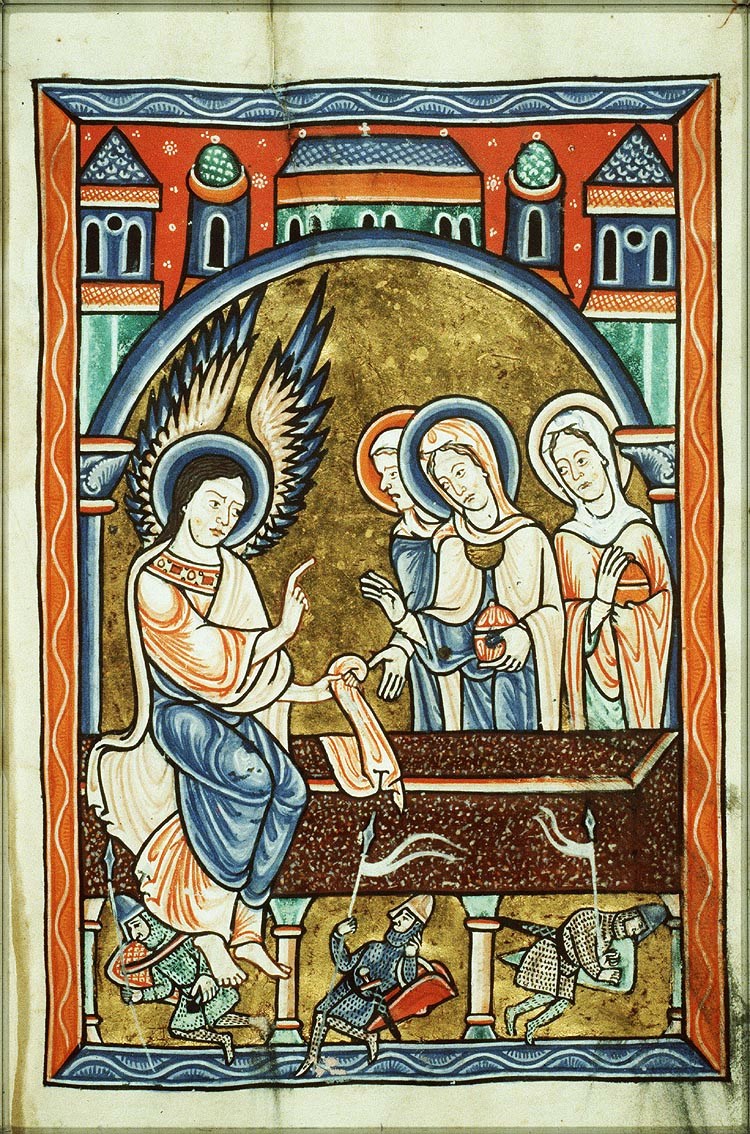 At the Resurrection Matins, there is a procession where the people walk around the church. This procession recalls the way the women went to the tomb. The people stop in front of the Church doors and listen to the priest announce “Christ is Risen!”
At the Resurrection Matins, there is a procession where the people walk around the church. This procession recalls the way the women went to the tomb. The people stop in front of the Church doors and listen to the priest announce “Christ is Risen!”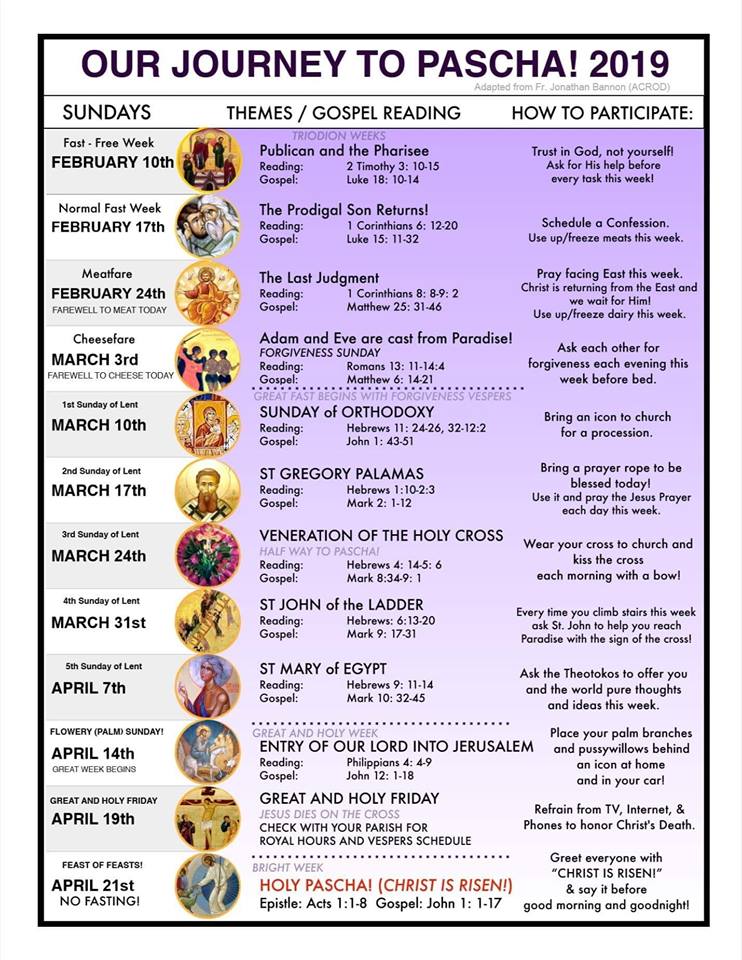
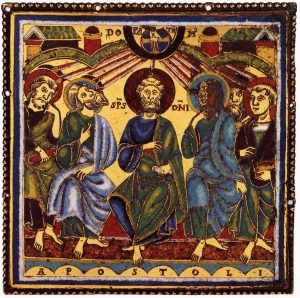 Pentecost is the fiftieth day, “the last and greatest day of the feast.” In the New Testament, this story is told only in the Acts of the Holy Apostles (Acts 2:1-12). On this day, the Holy Spirit came upon the disciples in the form, “as of fire” and they were filled with the Holy Spirit. (Acts 2:3) From this event, some observations can be made:
Pentecost is the fiftieth day, “the last and greatest day of the feast.” In the New Testament, this story is told only in the Acts of the Holy Apostles (Acts 2:1-12). On this day, the Holy Spirit came upon the disciples in the form, “as of fire” and they were filled with the Holy Spirit. (Acts 2:3) From this event, some observations can be made: The Resurrection and the Ascension are two separate concepts. This was known by the Gospel writers, particularly St. Luke. St. John also distinguishes the two, when Mary Magdalene meets the Risen Lord. Jesus says to her, “Stop holding [traditional: “do not cling to me”] on to me, for I have not yet ascended to the Father” (John 20:17). The Resurrection is the restoration to life of his human body, the Ascension is the glorification of Jesus, both God and man, at the right hand of the Father: “… the angels marveled at the sight of a human being more exalted than themselves. Today, the Father receives again in his bosom the one who was in him from eternity” (First sticheron at Psalm 140, Feast of Ascension).
The Resurrection and the Ascension are two separate concepts. This was known by the Gospel writers, particularly St. Luke. St. John also distinguishes the two, when Mary Magdalene meets the Risen Lord. Jesus says to her, “Stop holding [traditional: “do not cling to me”] on to me, for I have not yet ascended to the Father” (John 20:17). The Resurrection is the restoration to life of his human body, the Ascension is the glorification of Jesus, both God and man, at the right hand of the Father: “… the angels marveled at the sight of a human being more exalted than themselves. Today, the Father receives again in his bosom the one who was in him from eternity” (First sticheron at Psalm 140, Feast of Ascension). “Holy Father, keep them in your name that you have given me, so that they may be one just as we are” (John 17:11).
“Holy Father, keep them in your name that you have given me, so that they may be one just as we are” (John 17:11).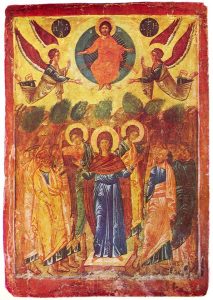 The ascension of our Lord into glory is the seal on his resurrection. Jesus taught Nicodemus, “No one has gone up to heaven except the one who has come down from heaven, the Son of Man” (John 3:13). St. Paul further explains that the ascension is the sign of his victory over the Hades, the kingdom of death, “What does ‘he ascended’ mean except that he also descended into the lower regions of the earth? The one who descended is also the one who ascended far above all the heavens, that he might fill all things” (Ephesians 4:9-10).
The ascension of our Lord into glory is the seal on his resurrection. Jesus taught Nicodemus, “No one has gone up to heaven except the one who has come down from heaven, the Son of Man” (John 3:13). St. Paul further explains that the ascension is the sign of his victory over the Hades, the kingdom of death, “What does ‘he ascended’ mean except that he also descended into the lower regions of the earth? The one who descended is also the one who ascended far above all the heavens, that he might fill all things” (Ephesians 4:9-10).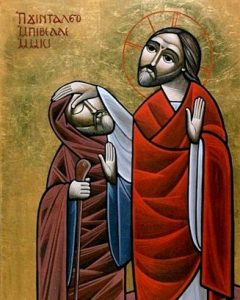 The story of the Man Born Blind is the third Sunday Gospel in Pascha about the mystery of baptism. This gospel is very clear, “Jesus spat on the ground and made clay with the saliva, and smeared the clay on his the blind man’s) eyes, and said to him, “Go wash in the Pool of Siloam” (which means Sent). So he went and washed, and came back able to see” (John 9:6-7). The clay represents the anointing we receive at baptism, making us “Anointed Ones,” (Christs, or Christians) and the washing represents the washing in the water of baptism. The blind man can then see, he is “enlightened,” the name the Church gives to baptism. Two observations: to be truly enlightened, we need humility.
The story of the Man Born Blind is the third Sunday Gospel in Pascha about the mystery of baptism. This gospel is very clear, “Jesus spat on the ground and made clay with the saliva, and smeared the clay on his the blind man’s) eyes, and said to him, “Go wash in the Pool of Siloam” (which means Sent). So he went and washed, and came back able to see” (John 9:6-7). The clay represents the anointing we receive at baptism, making us “Anointed Ones,” (Christs, or Christians) and the washing represents the washing in the water of baptism. The blind man can then see, he is “enlightened,” the name the Church gives to baptism. Two observations: to be truly enlightened, we need humility.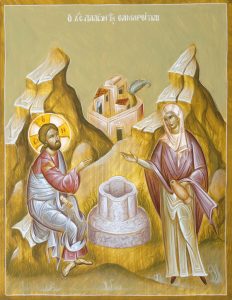 The theme of baptism continues in this Sunday’s Gospel, re-affirming that Pascha is a feast of resurrection and of baptism, being born into eternal life. The center of Jesus’ conversation with this unnamed woman (the Church later gave her the name Photine, the “enlightened woman”) is about water. They met at Jacob’s well, a place of great tradition, a sign and a promise of God’s love and mercy for his people. Jacob’s well provided the riches of water to a desert place, the sign that God would always provide for and bless his people. However, the encounter with the woman reveals something more: Jesus is the Messiah to come, he is greater than the Patriarch Jacob. The water of Jacob’s well is only for this world, Jesus would give “the water that would become a spring of water welling up to eternal life” (John 4:14). This clearly refers to our baptisms, as it comes immediately after the comparison of Jesus with John the Baptist, and the baptisms done by Jesus’ disciples. We renew our baptism every time we receive Communion, and they are for life, for eternal life, from God, the giver of life.
The theme of baptism continues in this Sunday’s Gospel, re-affirming that Pascha is a feast of resurrection and of baptism, being born into eternal life. The center of Jesus’ conversation with this unnamed woman (the Church later gave her the name Photine, the “enlightened woman”) is about water. They met at Jacob’s well, a place of great tradition, a sign and a promise of God’s love and mercy for his people. Jacob’s well provided the riches of water to a desert place, the sign that God would always provide for and bless his people. However, the encounter with the woman reveals something more: Jesus is the Messiah to come, he is greater than the Patriarch Jacob. The water of Jacob’s well is only for this world, Jesus would give “the water that would become a spring of water welling up to eternal life” (John 4:14). This clearly refers to our baptisms, as it comes immediately after the comparison of Jesus with John the Baptist, and the baptisms done by Jesus’ disciples. We renew our baptism every time we receive Communion, and they are for life, for eternal life, from God, the giver of life.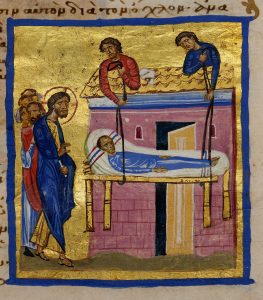 There are six Sundays in the forty day celebration of the Resurrection (corresponding to the forty days until the Ascension as recorded in the Gospel of Luke). The first three Sundays have a gospel of the Resurrection and the second three a gospel with a baptismal theme. Sadly, in our day the baptismal theme of the Feast of Pascha has sometimes been eclipsed, But Paul’s Letter to the Romans makes that connection: “Or are you unaware that we who were baptized into Christ Jesus were baptized into his death? We were indeed buried with him through baptism into death, so that, just as Christ was raised from the dead by the glory of the Father, we too might live in newness of life. (Romans 6:3-4)” This Sunday, we see this is the story of the Paralytic Man. He was without friends, paralyzed for thirty-eight years and unable to get into the pool when the angel touched the waters. However, he finds a friend in our Lord, who asks, “Do you want to be well?” This gospel affirms the sacramental mystery of baptism: it is not the water touched by an angel that cures the man, but the ultimate power of healing comes from the Lord, in the waters of baptism touched by the Holy Spirit sent by the Lord.
There are six Sundays in the forty day celebration of the Resurrection (corresponding to the forty days until the Ascension as recorded in the Gospel of Luke). The first three Sundays have a gospel of the Resurrection and the second three a gospel with a baptismal theme. Sadly, in our day the baptismal theme of the Feast of Pascha has sometimes been eclipsed, But Paul’s Letter to the Romans makes that connection: “Or are you unaware that we who were baptized into Christ Jesus were baptized into his death? We were indeed buried with him through baptism into death, so that, just as Christ was raised from the dead by the glory of the Father, we too might live in newness of life. (Romans 6:3-4)” This Sunday, we see this is the story of the Paralytic Man. He was without friends, paralyzed for thirty-eight years and unable to get into the pool when the angel touched the waters. However, he finds a friend in our Lord, who asks, “Do you want to be well?” This gospel affirms the sacramental mystery of baptism: it is not the water touched by an angel that cures the man, but the ultimate power of healing comes from the Lord, in the waters of baptism touched by the Holy Spirit sent by the Lord.